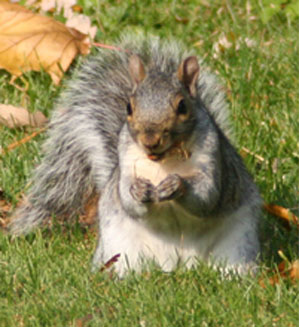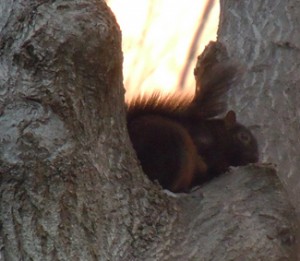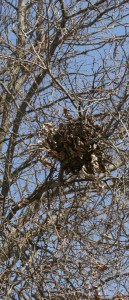Eastern Gray Squirrel
General:
The eastern gray squirrel, also known as the “bushy tail”, is one of the larger American squirrels. Not as large as the fox squirrel. They  are also one of the most widely recognized by people due to the fact they have readily adapted to suburban and even urban life. My father lives on the east side of Manhattan, New York. The neighborhood he lives in is inhabited by a black phase. I have counted as many as 6 gray squirrels at my upstate New York backyard birdfeeder in the winter.
are also one of the most widely recognized by people due to the fact they have readily adapted to suburban and even urban life. My father lives on the east side of Manhattan, New York. The neighborhood he lives in is inhabited by a black phase. I have counted as many as 6 gray squirrels at my upstate New York backyard birdfeeder in the winter.
 These squirrels do not hibernate. They are active all year round. They do build leaf nests in trees that can be easily spotted in winter after deciduous trees have dropped their leaves. They will also nest in abandoned woodpecker dens and natural tree cavities.
These squirrels do not hibernate. They are active all year round. They do build leaf nests in trees that can be easily spotted in winter after deciduous trees have dropped their leaves. They will also nest in abandoned woodpecker dens and natural tree cavities.
I consider the gray squirrel the biggest nuisance suburban wild animal. They will raid gardens and fruit trees. I have lost all the apples from 2 trees I have on my property to these squirrels. I have watched as they have climbed the trees and chewed a piece of apple and then just leave. They also climb up houses and have nested in house attics and garages causing much damage. I know people who have live trapped gray squirrels and relocated them only to have the same squirrel show up a week or so later.
The eastern gray squirrel can breed twice a year, mid-winter and late spring/early summer. Gestation is approximately 44 days. There are usually two to six young in each litter. The young are weaned in about 50 – 55 days. They leave the nest after about 70 days. According to Audubon, the second litter will usually stay with the female their first winter(1).
It can live to be 20 years old in captivity, but in the wild it usually only lives to a maximum of 12.5 years old.(2)
The eastern gray squirrel has been introduced into certain areas of Europe and England where they have taken habitat from native species.(2) A prime example why species introduction should be studied and debated before a decision is made.
Gray squirrels are a commonly hunted animal. They are fun to hunt and actually taste fine if handled properly. My favorite  gun is a .22 single shot. The best way to hunt is to look for stands of forest that carry their food sources – oaks, beech trees, pine and old apple orchards are all great places to look. Learn more about squirrel hunting by clicking this link here.
gun is a .22 single shot. The best way to hunt is to look for stands of forest that carry their food sources – oaks, beech trees, pine and old apple orchards are all great places to look. Learn more about squirrel hunting by clicking this link here.
Identification:
The eastern gray squirrel is approximately 14″ – 19″ long (tail being up to 9″) and from 1/2 to 1 lb. They are gray above, on their back and head, Their belly is lighter gray/buff white. The tail is bushy gray. There are black phases of this animal that I particularly like as well as albino.
The gray squirrel is similar in appearance to the fox squirrel but is slightly smaller and lacks the reddish-orange coloratio
n. The head, back, and sides are gray with a brownish tint. The tail is bushy with hairs being buffy at the base, black in the middle, and white at the ends. The fur on gray squirrels can fade during winter months and therefore may appear more reddish in color during these times.
Habitat:
Hardwood forests with stands of the trees that provide food. Oak-hickory forests are prime. Mixed hardwood forests with pine. Also forest bordering agricultural lands. These animals will travel for their food.
Territory:
The eastern gray squirrel is found in the eastern United States and south Eastern Canada, (Ontario, Quebec, New Brunswick to Manitoba), south to eastern Texas and Florida north to Maine.
Diet :
:
Eastern gray squirrels eat a range of foods, but are primarily herbivores. Foods such as tree bark, seeds and acorns, walnuts, and other nuts, tree buds, such as maple and tulip tree buds, and some types of fungi. They will also eat insects as well young birds and the young of other squirrels.
The Scat of the eastern gray squirrel is small, black and oblong. It is usually inconspicuous.
Check out USGS website for more gray squirrel information
